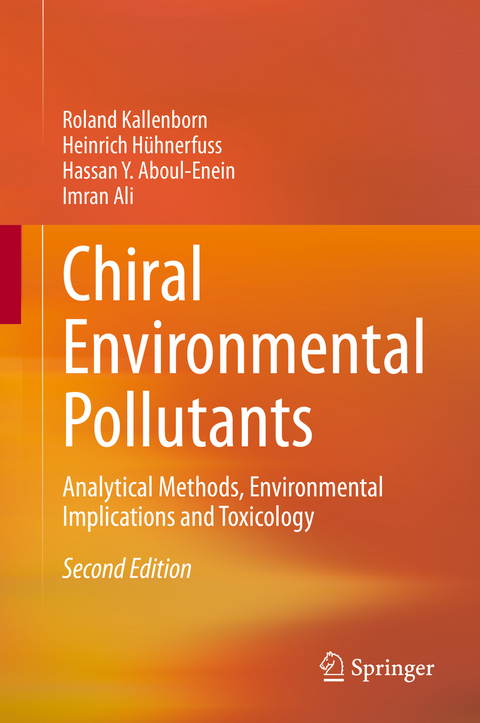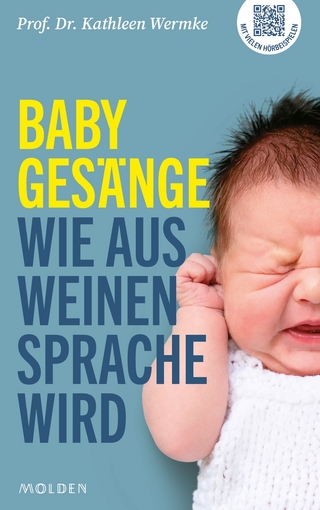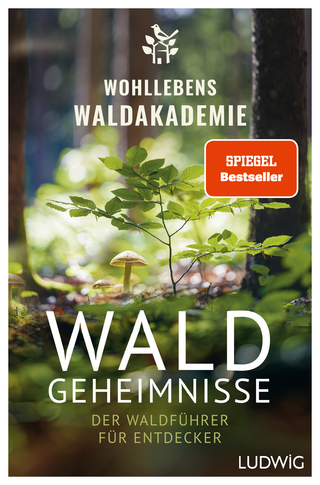
Chiral Environmental Pollutants
Springer International Publishing (Verlag)
978-3-030-62455-2 (ISBN)
lt;p>Roland Kallenborn is a Professor of Organic Analytical Chemistry, Organic Environmental Chemistry at the Faculty of Chemistry, Biotechnology and Food Sciences (KBM) from the Norwegian University of Life Sciences (NMBU) and holds an Adjunct Professor position at the University Center in Svalbard (UNIS). As an environmental chemistry, his mains research focuses on method development for identification, characterisation and mitigation of organic environmental pollutants (including contaminants of emerging concern and transformation products), and on elucidation of pollutant profiles in urban agriculture, food processing and Arctic environments. He applies modern trace analytical methods in an interdisciplinary context in his research strategies. Professor Kallenborn is author/co-author of 120 peer reviewed publications, 12 books (author, chapter author and editor), 20 contract reports, 10 popular science papers and 250+ presentations (poster/ oral) at international conferences and seminars. He serves as editor/ editorial board member for the Journals "Current Chromatography", "Fresenius Environmental Bulletin", "Ecotoxicology and Chemistry", "Environmental Science and Pollution Research" and "Chemosphere".
Heinrich Hühnerfuss is a Professor Emeritus at the Department of Chemistry of the University of Hamburg, Germany, where he started his studies in 1963, and received his Ph. D. in 1971. His main research interests include ecotoxicology, biota, water and sediment analyses, remote sensing and characterization of anthropogenic and biogenic monolayers at the air/water interface. Throughout his career, Professor Hühnerfuss has actively contributed to these fields by publishing +200 scientific articles and books.
Hassan Y Aboul Enein is a Professor Emeritus at the Pharmaceutical and Medicinal Chemistry Department, National Research Center in Cairo, Egypt. He was the Head of the Pharmaceutical Analysis Laboratory at King Faisal Specialist Hospital and Research Centre, Riyadh, Saudi Arabia. Professor Aboul-Enein is the author and coauthor of 1100+ refereed articles, 48 book chapters and 365 conference presentations. He is also authored and edited 8 books in the field of analytical chemistry. He is a Member of the World Health Organization (WHO) advisory panel in International Pharmacopoeia and Pharmaceutical Preparations and a Fellow of the Royal Society of Chemistry (UK).
Imran Ali is a Professor at Jamia MIllia Islamia Central University, New Delhi, India. He is a world recognized academician and researcher with 425+ scientific publications including patents, books, book chapters, research papers, technical reports and conference presentations. His work has been highly cited with a h-index of 80 and i10-index of 255. His research areas include chiral pollutants, nanotechnology for water treatment, bioanalytical and medicinal chemistry. He is a leading researcher in chiral pollutants and nanotechnology. Based on his international recognition and high citation, Prof. Ali is designated as fellow and chartered chemist by the Royal Society of Chemistry, London UK. His books and papers are being used as reference sources all over the world. The methods and technologies developed are also being used by many industries.
Introduction.- Criteria for the selection of a proper enantiomer selective analytical method.- Enantiomer selective high- and ultra-high performance liquid chromatography.- Enantiomer selective electrophoresis and electrochromatography.- Enantiomer selective high-resolution gas chromatography (esHRGC).- Other methods for the elucidation of molecular structures and mechanistic details of enantiomers.- Quality control and evaluation criteria for enantiomer selective separation methods in environmental sciences.- Enantiomer specific fate and behaviour of chiral contaminants.- Source Characterization and Contamination.- Chirality in environmental toxicity and fate assessments.- Perspectives.
lt;p>From the reviews of the 1st Edition:
"The authors present the state of the art and future development on environmental enantioselective trace analysis and the environmental fate of organic chiral pollutants. ... a comprehensive survey of enantioselective trace analysis, and, what is excellent, the authors try to relate these data to the ecotoxological effects of chiral pollutants. ... the layout is clear, and the examples in tables and figures are carefully chosen. ... it delivers a comprehensive survey for environmental trace analysts, analytical chemists, ecotoxicologists, food scientists and graduate students ... ." (Jussi V. K. Kukkonen, International Journal of Environment and Pollution, Vol. 18 (1), 2002)
"This book is a welcome addition to fill the gap in the previously published books and monographs that discuss chirality and chiral analysis of pharmaceuticals. ... this book is a valuable reference and a 'must have' since it focuses on the impact of chirality on environmental pollutants. The book is highly recommended to research scientists, graduate students and chemists who are especially involved in the field of environmental analysis. Furthermore, governmental regulatory agencies will find this book of great benefit." (Hassan Y. Aboul-Enein, Biomedical Chromatography, Vol. 16 (4), 2002)
"The authors have tried to give a comprehensive survey of the state-of-the-art of enantioselective trace analysis and also to reflect the future of this promising field of analytical research. ... This monograph is employable to environmental trace analysts, analytical chemists, ecotoxicologists, food scientists, and also experienced laboratory personnel. " (Advances in Food Science Vol. 23 (4), 2001)
"The central topic of the book is to present the state of the art and future development of environmental enantioselective trace analysis and its implications in ecotoxicological studies. ... The topics presented in the book are very well illustrated with practical details and case studies, as well as almost 500 references. ... This monograph is highly recommended for environmental trace analysts, analytical chemists, ecotoxicologists and food scientists. " (International Journal of Environmental Analytical Chemistry, Vol. 81, 2001)
| Erscheinungsdatum | 31.01.2021 |
|---|---|
| Zusatzinfo | XVI, 323 p. 57 illus., 19 illus. in color. |
| Verlagsort | Cham |
| Sprache | englisch |
| Maße | 155 x 235 mm |
| Gewicht | 676 g |
| Themenwelt | Sachbuch/Ratgeber ► Natur / Technik ► Natur / Ökologie |
| Naturwissenschaften ► Biologie ► Ökologie / Naturschutz | |
| Naturwissenschaften ► Chemie ► Technische Chemie | |
| Schlagworte | Bioactivity of anthropogenic pollutants • Chirality in the environment • Chiral Separation • Chromatography • Ecotoxicological effects • ecotoxicology • Emerging Pollutants • Enantiomer distribution • Environmental change response • xenobiotics |
| ISBN-10 | 3-030-62455-2 / 3030624552 |
| ISBN-13 | 978-3-030-62455-2 / 9783030624552 |
| Zustand | Neuware |
| Informationen gemäß Produktsicherheitsverordnung (GPSR) | |
| Haben Sie eine Frage zum Produkt? |
aus dem Bereich


